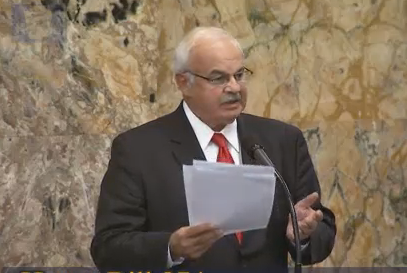State Lawmaker Pitches Bill to Reform Sex Crime Laws; No Recourse for Past Victims Provided
By Ivey DeJesus
The senior ranking member of the state House Judiciary Committee on Monday unveiled legislation designed to reform Pennsylvania's sex crime laws. The legislation introduced by Majority Chairman Ron Marsico (R-Dauphin) would overhaul the law going forward but contains no retroactive components. Retroactive measures have been a key demand from victims of sexual abuse who have "timed out of the system," particularly victims who were abused as children." "My choice to not include a retroactive period in this legislation was not easy," Marsico said in a written statement. "As a father and grandfather, I am horrified by allegations of sex abuse. But, I also fear the huge negative impact it would potentially have on many nonprofit community groups and the services they provide due to the massive lawsuits they might end up facing for actions that may have occurred decades ago by people who are no longer even affiliated with those nonprofit groups. These groups were created to help people and I would not want those people to lose access to life-supporting services." Marsico's proposed legislation would abolish the criminal statute of limitations for future criminal prosecutions. "That way, justice will always be served because no one who sexually abuses a child then will ever be free from criminal prosecution merely because of a lapsed statute of limitations," he said. Marsico also backed raising the civil statute-of-limitations to age 50. Victims advocates have recently pushed aggressively for reform in the wake of a grand jury report that found that hundreds if not thousands of children in the Altoona-Johnstown Diocese had been abused for decades by more than 50 priests. Investigators found that church leaders and officials knew about the abuse but concealed it, and continued to assign abusive priests to posts that would give them access to children. Three grand jury reports out of the Philadelphia Archdiocese and the Jerry Sandusky child sex abuse case have also fueled demands for changes to the law. Advocates have demanded changes to accommodate victims who fall out of the parameters of the law. Under current law, victims of child sexual abuse are barred from seeking civil action after they reach the age of 30. That leaves out many of the victims from Philadelphia and Altoona-Johnstown. Under current law, victims can bring criminal charges against offenders until they reach 50 years of age — but only if the victim turned 18 years old after Aug. 27, 2002. The law allows victims older than that to report until their 30th birthday. "The issue of the statute of limitations in child sex abuse cases is not a new one in the legislature," Marsico said. "Over the years, I have met with several district attorneys and representatives of the state district attorneys association and discussed criminal investigations and prosecution of child sexual abuse, as well as victims' civil remedies and the impact their proposals might have on preventing abuse and bringing offenders to justice. "I have also supported, and continue to support, measures to educate children on ways to report abuse, to provide training for parents and teachers to recognize abuse and to allocate resources designed to locate and prosecute sexual predators. Marsico said the judiciary committee was "working expeditiously" to reform the law. His legislation is slated to go before the House Judiciary Committee on Tuesday. Contact: idejesus@pennlive.com
|
.
Any original material on these pages is copyright © BishopAccountability.org 2004. Reproduce freely with attribution.
